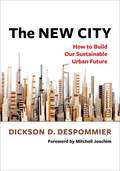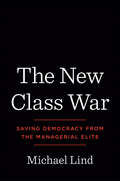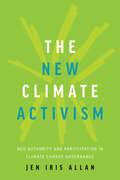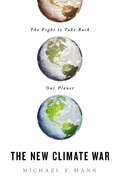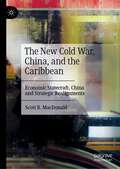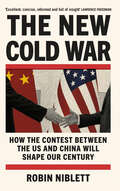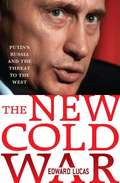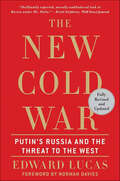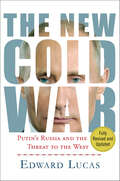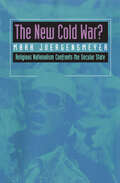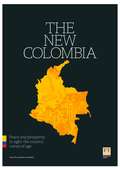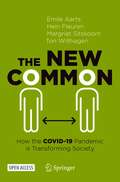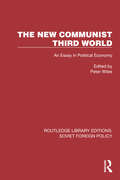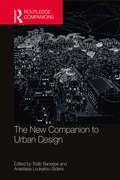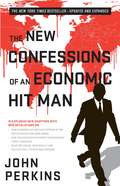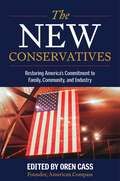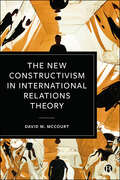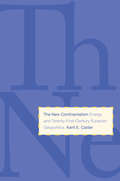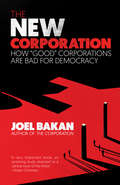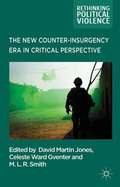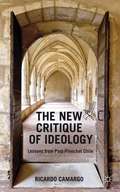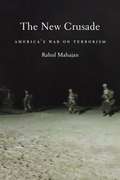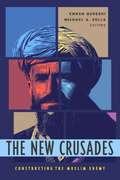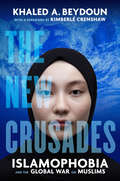- Table View
- List View
The New City: How to Build Our Sustainable Urban Future
by Dickson DespommierCities are at once among humanity’s crowning achievements and core drivers of the climate crisis. Their dependence on the outside world for vital resources is causing global temperatures to rise and wildlife habitats to shrink. But we have the opportunity to make cities more sustainable by transforming the built environment.Dickson D. Despommier proposes a visionary yet achievable plan for creating a new, self-sustaining urban landscape. He argues that we can find solutions through the concept of biomimicry: emulating successful strategies found in nature. A better city is possible if we heed the lessons that forests and trees teach about how to store carbon, grow food, collect rainwater, and convert sunlight into energy. Touring established and leading-edge technologies, The New City provides a blueprint for tomorrow’s urban environment. Cities built from wood will be more resilient and less destructive than concrete and steel construction; they will also encourage reforestation, boosting carbon sequestration. Vertical farms inside city limits will supply residents with a reliable, healthy food supply. Buildings will harvest moisture from the rain and air to secure a clean water supply. Renewable energy, including not only wind, solar, and geothermal but also clear photovoltaic window glass and nonpolluting hydrogen fuel cells, will power a cleaner city.The New City delivers both a passionate call to action for halting climate change and a bold vision of the sustainable future within our grasp.
The New Class War: Saving Democracy from the Managerial Elite
by Michael LindIn both Europe and North America, populist movements have shattered existing party systems and thrown governments into turmoil. The embattled establishment claims that these populist insurgencies seek to overthrow liberal democracy. The truth is no less alarming but is more complex: Western democracies are being torn apart by a new class war. In this controversial and groundbreaking new analysis, Michael Lind, one of America&’s leading thinkers, debunks the idea that the insurgencies are primarily the result of bigotry, traces how the breakdown of mid-century class compromises between business and labor led to the conflict, and reveals the real battle lines. On one side is the managerial overclass—the university-credentialed elite that clusters in high-income hubs and dominates government, the economy and the culture. On the other side is the working class of the low-density heartlands—mostly, but not exclusively, native and white. The two classes clash over immigration, trade, the environment, and social values, and the managerial class has had the upper hand. As a result of the half-century decline of the institutions that once empowered the working class, power has shifted to the institutions the overclass controls: corporations, executive and judicial branches, universities, and the media. The class war can resolve in one of three ways: • The triumph of the overclass, resulting in a high-tech caste system. • The empowerment of populist, resulting in no constructive reforms • A class compromise that provides the working class with real power Lind argues that Western democracies must incorporate working-class majorities of all races, ethnicities, and creeds into decision making in politics, the economy, and culture. Only this class compromise can avert a never-ending cycle of clashes between oligarchs and populists and save democracy.
The New Class: An Analysis of the Communist System
by Milovan DjilasDjilas' book written in the nineteen fifties was a real bombshell for the top of the Communist Party's and in leftist circles in Europe. It exposed the communist countries as regimes ruled by a very small oligarchy of high level party members.
The New Climate Activism: NGO Authority and Participation in Climate Change Governance
by Jen AllanAt the 2019 UN climate change conference, activists and delegates for groups representing Indigenous, youth, women, and labour rights were among those marching through the halls chanting "Climate Justice, People Power." In The New Climate Activism, Jen Iris Allan looks at why and how these social activists came to participate in climate change governance while others, such as those working on human rights and health, remain on the outside of climate activism. Through case studies of women’s rights, labour, alter-globalization, health, and human rights activism, Allan shows that some activists sought and successfully gained recognition as part of climate change governance, while others remained marginalized. While concepts key to some social activists, including gender mainstreaming, just transition, and climate justice are common terms, human rights and health remain "fringe issues" in climate change governance. The New Climate Activism explores why and how these activists brought their issues to climate change, and why some succeeded while others did not.
The New Climate War: The Fight to Take Back Our Planet
by Michael E. MannA renowned climate scientist shows how fossil fuel companies have waged a thirty-year campaign to deflect blame and responsibility and delay action on climate change, and offers a battle plan for how we can save the planet. Recycle. Fly less. Eat less meat. These are some of the ways that we've been told can slow climate change. But the inordinate emphasis on individual behavior is the result of a marketing campaign that has succeeded in placing the responsibility for fixing climate change squarely on the shoulders of individuals.Fossil fuel companies have followed the example of other industries deflecting blame (think "guns don't kill people, people kill people") or greenwashing (think of the beverage industry's "Crying Indian" commercials of the 1970s). Meanwhile, they've blocked efforts to regulate or price carbon emissions, run PR campaigns aimed at discrediting viable alternatives, and have abdicated their responsibility in fixing the problem they've created. The result has been disastrous for our planet.In The New Climate War, Mann argues that all is not lost. He draws the battle lines between the people and the polluters-fossil fuel companies, right-wing plutocrats, and petrostates. And he outlines a plan for forcing our governments and corporations to wake up and make real change, including:a common-sense, attainable approach to carbon pricing- and a revision of the well-intentioned but flawed currently proposed version of the Green New Deal;allowing renewable energy to compete fairly against fossil fuelsdebunking the false narratives and arguments that have worked their way into the climate debate and driven a wedge between even those who support climate change solutionscombatting climate doomism and despair-mongering With immensely powerful vested interests aligned in defense of the fossil fuel status quo, the societal tipping point won't happen without the active participation of citizens everywhere aiding in the collective push forward. This book will reach, inform, and enable citizens everywhere to join this battle for our planet.
The New Cold War, China, and the Caribbean: Economic Statecraft, China and Strategic Realignments
by Scott B. MacDonaldThis book examines the slide into a new Cold War in the Caribbean. The primary argument is that the Caribbean’s geopolitics have shifted from a period of relative great power disinterest in the aftermath of the Cold War to a gradual movement into a new Cold War in which a global rivalry between the U.S. and China is acted out regionally. The result of this is a gradual polarization of countries in the Caribbean as they are increasingly pressured to choose between Washington and Beijing (this being very evident during the Trump years). It can be argued that the U.S. focus on the Caribbean in the late 1990s through the early 21st century diminished, leaving the region open to a China ready and eager to do business and guided by a diverse set of objectives. The book brings the reader into a discussion on international relations with a main focus on U.S.-Chinese relations being played out in the Caribbean, an important strategic region for the North American country.
The New Cold War: How the Contest Between the US and China Will Shape Our Century
by Robin NiblettAn urgent and essential assessment of the global contest between the US and China, and how looking to history will help us to navigate it, from former Director of Chatham House"An illuminating book for the interested citizen as well as for those making policy" - Hillary Rodham Clinton We have entered a new Cold War. The contest between America and China is global and unbridgeable, and it encompasses all major instruments of statecraft - economic, political and military. It has its tinder box: Taiwan. And both protagonists are working hard to draw allies to their side from across the world. We stand at its beginning. But this Cold War is nothing like the conflict between the Soviet Union and the West which defined the second half of the twentieth century. We need new ideas to navigate its risks and avoid a globally devastating hot war. In this urgent and necessary book, Robin Niblett argues that only by looking back can we learn the lessons to guide us through this new reality: he goes through the ten ways in which the New Cold War is different and offers five rules for navigating its onset. How we manage this contest will determine not only whether there is still space for international cooperation to deal with our many global challenges, from the climate emergency to the technological revolution, but also who will lead the twenty-first century and, quite simply, the course of all our futures.
The New Cold War: Putin's Russia and the Threat to the West
by Edward LucasAs a seasoned veteran correspondent for The Economist, Edward Lucas carefully constructs his assessment of Russia's lack of a clear political identity, and its changing course after the Cold War.
The New Cold War: Putin's Russia and the Threat to the West
by Edward LucasThe first edition of The New Cold War was published to great critical acclaim and Edward Lucas has established himself as a top expert in the field, appearing on numerous programs, including Lou Dobbs, MSNBC, NBC Nightly News, CNN, and NPR. In this new revised and updated edition for 2009, Lucas reveals: -The truth about the corrupt elections that made Dmitri Medvedev President of Russia-How, as prime minister, Vladimir Putin remains the de facto leader of Russia-The Kremlin's real goals in waging war in Georgia; -How the conflict might soon spill into other former Soviet republics. Hard-hitting and powerful, The New Cold War is a sobering look at Russia's current aggression and what it means for the world.
The New Cold War: Putin's Russia and the Threat to the West
by Edward LucasThe first edition of The New Cold War was published to great critical acclaim. Edward Lucas has established himself as a top expert in the field, appearing on numerous programs, including Lou Dobbs, MSNBC, NBC Nightly News, CNN, and NPR. Since TheNew Cold War was first published in February 2008, Russia has become more authoritarian and corrupt, its institutions are weaker, and reforms have fizzled. In this revised and updated third edition, Lucas includes a new preface on the Crimean crisis, including analysis of the dismemberment of Ukraine, and a look at the devastating effects it may have from bloodshed to economic losses. Lucas reveals the asymmetrical relationship between Russia and the West, a result of the fact that Russia is prepared to use armed force whenever necessary, while the West is not. Hard-hitting and powerful, The New Cold War is a sobering look at Russia's current aggression and what it means for the world.This edition includes 30% updated material. It is also fully updated to include an incisive analysis of the Crimean crisis, from Russia's seizure of the region to the dismemberment of Ukraine.
The New Cold War?: Religious Nationalism Confronts the Secular State (Comparative Studies in Religion and Society #5)
by Mark JuergensmeyerWill the religious confrontations with secular authorities around the world lead to a new Cold War? Mark Juergensmeyer paints a provocative picture of the new religious revolutionaries altering the political landscape in the Middle East, South Asia, Central Asia, and Eastern Europe. Impassioned Muslim leaders in Egypt, Palestine, and Algeria, political rabbis in Israel, militant Sikhs in India, and triumphant Catholic clergy in Eastern Europe are all players in Juergensmeyer's study of the explosive growth of religious movements that decisively reject Western ideas of secular nationalism.Juergensmeyer revises our notions of religious revolutions. Instead of viewing religious nationalists as wild-eyed, anti-American fanatics, he reveals them as modern activists pursuing a legitimate form of politics. He explores the positive role religion can play in the political life of modern nations, even while acknowledging some religious nationalists' proclivity to violence and disregard of Western notions of human rights. Finally, he situates the growth of religious nationalism in the context of the political malaise of the modern West. Noting that the synthesis of traditional religion and secular nationalism yields a religious version of the modern nation-state, Juergensmeyer claims that such a political entity could conceivably embrace democratic values and human rights.
The New Colombia: the country comes of age
by Financial TimesColombia is usually associated with drug cartels, guerrilla wars and violence. But the biggest Spanish-speaking country after Mexico is changing. The economy is already larger, by some measures, than South Africa’s; if peace talks are successful, it will do better still. This free ebook is an indispensable guide to the new Colombia, reproducing a magazine published earlier this year by the Financial Times.<P><P> FT writers interview President Juan Manuel Santos and profile both the Bogota establishment and young Colombians to watch. They explore the development challenges of the Colombian outback and the rise of a new national export - security expertise ranging from bullet proof fashion to mercenaries. Essays by Oscar Naranjo, former head of the national police, and Malcolm Deas, historian, provide further context.
The New Common: How the COVID-19 Pandemic is Transforming Society
by Emile Aarts Hein Fleuren Margriet Sitskoorn Ton WilthagenThis open access book presents the scientific views of some fifty experts on how they believe the COVID-19 pandemic is currently affecting society, and how it will continue to do so in the years to come. Using the concept of a “common” (in the sense of common values, common places, common goods, and common sense), they elaborate on the transition from an Old Common to a New Common. In carefully crafted chapters, the authors address expected shifts in major fields like health, education, finance, business, work, and citizenship, applying concepts from law, psychology, economics, sociology, religious studies, and computer science to do so. Many of the authors anticipate an acceleration of the digital transformation in the forthcoming years, but at the same time, they argue that a successful shift to a new common can only be achieved by re-evaluating life on our planet, strengthening resilience at an individual level, and assuming more responsibility at a societal level.
The New Communist Third World: An Essay in Political Economy (Routledge Library Editions: Soviet Foreign Policy #11)
by Peter WilesThe New Communist Third World (1982) discuss the economic policies of the Soviet Union towards the countries of the developing world adopting a Marxist-Leninist form of government. The authors demonstrate as well the variety of political systems covered by the term Communism, and provide an interesting counter-balance to traditional views of the Third World and aid policies.
The New Companion to Urban Design
by Tridib Banerjee Anastasia Loukaitou-SiderisThe New Companion to Urban Design continues the assemblage of rich and critical ideas about urban form and design that began with the Companion to Urban Design (Routledge, 2011). With chapters from a new set of contributors, this sequel offers a more comparative perspective representing multiple voices and perspectives from the Global South. The essays in this volume are organized in three parts: Part I: Comparative Urbanism; Part II: Challenges; and Part III: Opportunities. Each part contains distinct sections designed to address specific themes, and includes a list of annotated suggested further readings at the end of each chapter. Part I: Comparative Urbanism examines different variants of urbanism in the Global North and the Global South, produced by a new economic order characterized by the mobility of labor, capital, information, and technology. Part II: Challenges discusses some of the contemporary challenges that cities of the Global North and the Global South are facing and the possible role of urban design. This part discusses spatial claims and conflicts, challenges generated by urban informality, explosive growth or dramatic shrinkage of the urban settlement, gentrification and displacement, and mimesis, simulacra and lack of authenticity. Part III: Aspirations discusses some normative goals that urban design interventions aspire to bring about in cities of the Global North and the Global South. These include resilience and sustainability, health, conservation/restoration, justice, intelligence, access and mobility, and arts and culture. The New Companion to Urban Design is primarily intended for scholars and graduate students interested in cities and their built environment. It offers an invaluable and up-to-date guide to current thinking across a range of disciplines including urban design, planning, urban studies, and geography.
The New Confessions of an Economic Hit Man
by John PerkinsShocking Bestseller: The original version of this astonishing tell-all book spent 73 weeks on the New York Times bestseller list, has sold more than 1.25 million copies, and has been translated into 32 languages. New Revelations: Featuring 15 explosive new chapters, this expanded edition of Perkins's classic bestseller brings the story of economic hit men (EHMs) up to date and, chillingly, home to the US. Over 40 percent of the book is new, including chapters identifying today's EHMs and a detailed chronology extensively documenting EHM activity since the first edition was published in 2004.Former economic hit man John Perkins shares new details about the ways he and others cheated countries around the globe out of trillions of dollars. Then he reveals how the deadly EHM cancer he helped create has spread far more widely and deeply than ever in the US and everywhere else--to become the dominant system of business, government, and society today. Finally, he gives an insider view of what we each can do to change it.Economic hit men are the shock troops of what Perkins calls the corporatocracy, a vast network of corporations, banks, colluding governments, and the rich and powerful people tied to them. If the EHMs can't maintain the corrupt status quo through nonviolent coercion, the jackal assassins swoop in. The heart of this book is a completely new section, over 100 pages long, that exposes the fact that all the EHM and jackal tools--false economics, false promises, threats, bribes, extortion, debt, deception, coups, assassinations, unbridled military power--are used around the world today exponentially more than during the era Perkins exposed over a decade ago.The material in this new section ranges from the Seychelles, Honduras, Ecuador, and Libya to Turkey, Western Europe, Vietnam, China, and, in perhaps the most unexpected and sinister development, the United States, where the new EHMs--bankers, lobbyists, corporate executives, and others--"con governments and the public into submitting to policies that make the rich richer and the poor poorer."But as dark as the story gets, this reformed EHM also provides hope. Perkins offers a detailed list of specific actions each of us can take to transform what he calls a failing Death Economy into a Life Economy that provides sustainable abundance for all.
The New Conservatives: Restoring America's Commitment to Family, Community, and Industry
by Oren Cass American CompassFor the fifth anniversary of American Compass, the conservative think tank hailed by the Wall Street Journal as "the forefront of rethinking traditional conservative economic ideas," comes a collection of its best, most influential writingAmerican Compass is the nerve center of the New American Right, the political strategists and policy experts navigating a new Republican path through the economic issues shaping today&’s political landscape—trade and immigration, technology and finance, industrial policy, education, welfare, labor, family, and more. The New Conservatives is the organization&’s ur-text, a collection of its most influential writing on why and how true conservative government fosters markets that serve society—not the other way around. As The Economist put it, American Compass is &“a slaughterhouse for Republican sacred cows.&” With essays and manifestos by American Compass founder Oren Cass, New America co-founder Michael Lind, U.S. Secretary of State Marco Rubio, National Affairs founding editor Yuval Levin, American Affairs founding editor Julius Krein, author and former American Conservative senior editor Helen Andrews, and Comment senior editor Brian Dijkema, The New Conservatives breaks down America&’s economic and political failures before drawing upon a re-assessed American conservative tradition to prove how an innovative conservative movement, breaking from the GOPs free-market dogmatism, is defined by three pillars—productive markets, supportive communities, and responsive politics. The book explores American Compass&’ groundbreaking projects, like the Cost-of-Thriving Index, which explains how the typical American worker could once provide a family with middle-class security on 40 weeks of work but now requires more than 60—a problem, there being 52 weeks in a year. It refines the American conservative tradition, which most people today wrongly assume emphasized free markets and limited government, reminding readers that the early American republic pursued a robust national economic policy with high protective tariffs and intensive public investment. It offers new conservative critiques of modern markets that have failed to deliver on capitalism&’s promise that globalization, cheap labor, and financial markets will deliver widespread prosperity. And it sets capitalism&’s sights on community: re-calibrating a right-of-center attitude toward families, worker power and solidarity, and higher education. The New Conservatives, published in celebration of American Compass&’ fifth anniversary, is a conservative manifest, a ship&’s log, and an updated nautical chart to an economy in which free markets are not an end unto themselves, but are rather a means to an end—national liberty and prosperity—steered by public policy.
The New Constructivism in International Relations Theory
by David M. McCourtIn this engaging book, David M. McCourt makes the case for New Constructivist approaches to international relations scholarship. The book traces constructivist work on culture, identity, and norms within the historical, geographical, and professional contexts of world politics, and reflects on recent innovations in fields including practice theory, relationalism, and network analysis. Copiously illustrated with real-world examples from the rise of China and US foreign policy, it illuminates the processes by which international politics are built. This is both an accessible tour of Constructivism to date and a persuasive declaration for its continuing application and value.
The New Continentalism
by Kent E. CalderIn this groundbreaking book Kent E. Calder argues that a new transnational configuration is emerging in Asia, driven by economic growth, rising energy demand, and the erosion of longstanding geopolitical divisions. What Calder calls the New Silk Road—with a strengthening multi-faceted relationship between East Asia and the Middle East at its core—could eventually emerge as one of the world’s most important multilateral configurations. Straddling the border between comparative politics and international relations theory, this important book will stimulate debate and discussion in both fields.
The New Corporation: How "Good" Corporations Are Bad for Democracy
by Joel Bakan"A very important book, an arresting study directed to a central issue of the times." —Noam ChomskyFrom the author of The Corporation: The Pathological Pursuit of Profit and Power comes this deeply informed and unflinching look at the way corporations have slyly rebranded themselves as socially conscious entities ready to tackle society's problems, while CEO compensation soars, income inequality is at all-time highs, and democracy sits in a precarious situation.Over the last decade and a half, business leaders have been calling for a new kind of capitalism. With income inequality soaring, wages stagnating, and a climate crisis escalating, they realized that they had to make social and environmental values the very core of their messaging. There is just one small problem with their new conscientious pitch: corporations are still, first and foremost, concerned with their bottom-line. In lucid and engaging prose, Joel Bakan lays bare a litany of dangerous corporate actions and documents how increasing corporate freedom encroaches on individual liberty and democracy. Through deep research and interviews with both top executives and their sharpest critics, he exposes the inhumanity and destructive force of the current order—profit-driven privatization subverting the public good, business-pressured governments neglecting duties to protect the environment and citizens&’ rights, the increasing alienation we experience as every aspect of life is economized, and how the novel Coronavirus pandemic reveals the unjust fault lines of our corporate-led society. Beyond diagnosing major problems, in The New Corporation Bakan narrates a hopeful path forward. He reveals how citizens around the world are fighting back and making gains in ways that bolster democracy and benefit ordinary citizens rather than the corporate elite.
The New Counter-insurgency Era in Critical Perspective
by David Martin Jones Celeste Ward Gventer M.L.R. SmithThe notion of counter-insurgency has become a dominant paradigm in American and British thinking about the wars in Iraq and Afghanistan. This volume brings together international academics and practitioners to evaluate the broader theoretical and historical factors that underpin COIN, providing a critical reappraisal of counter-insurgency thinking.
The New Critique of Ideology
by Ricardo CamargoThis book offers a new ideology critique for political analysis by revisiting Habermas via a Žižekian reading. The book includes an application of the theory to the case of the political consensus reached in Chile's post-Pinochet.
The New Crusade: America's War On Terrorism
by Rahul MahajanThe attack on the World Trade Center and the Pentagon on September 11, 2001 and the US government response, especially after the bombing of Afghanistan, transformed US and global politics. —Will the US-led war on terrorism rid the world of this scourge, or fuel the hatred and suffering on which it feeds? —Will the middle East and central Asia be stabilized once Afghanistan is reduced to rubble and starvation, or become a zone of enduring war? —Within the United States, will it bring about new forms of patriotism and solidarity, or provide a platform for intensified racism, new assaults on civil liberties, and on the living standards of ordinary Americans? This book locates ongoing events in the aftermath of September 11 in historical context, analyzes their motive forces and possible outcomes, and examines the alternatives that face the anti-globalization movement and opponents of racism and war. The New Crusade sets out the main historical and political issues at stake clearly, accessibly, and comprehensively. It examines US policy in the middle East from the break-up of the Soviet Union, ongoing sanctions against Iraq, and the quest for a US oil pipeline from the former Soviet republics through Afghanistan; the ideology of the National Security State and its implications for global conflict; the nature of humanitarian interventions in the Third World; and the questions of international law raised by terrorism. It concludes with a fresh appraisal of the options facing us today. Reflecting both deep knowledge of the region and the commitment and hands-on experience of a seasoned activist, Mahajan provides a powerful interpretation of events that will be decisive in the making of our time.
The New Crusades: Constructing the Muslim Enemy
by Michael Sells Emran QureshiNot since the Crusades of the Middle Ages has Islam evoked the degree of fear, hostility, and ethnic and religious stereotyping that is evident throughout Western culture today. As conflicts continue to proliferate around the globe, the perception of a colossal, unyielding, and unavoidable struggle between Islam and the West has intensified. These numerous conflicts, both actual and ideological, have revived fears of an ongoing "clash of civilizations"—an intractable and irreconcilable conflict of values between Western cultures and an Islam that is portrayed as hostile and alien. The New Crusades takes head-on the idea of an emergent "Cold War" between Islam and the West. It explores the historical, political, and institutional forces that have raised the specter of a threatening and monolithic Muslim enemy and provides a nuanced critique of much received wisdom on the topic, particularly the "clash of civilizations" theory. Bringing together twelve of the most influential thinkers in Middle Eastern and religious studies—including Edward Said, Roy Mottahedeh, and Fatema Mernissi—this timely collection confronts such depictions of the Arab-Islamic world, showing their inner workings and how they both empower and shield from scrutiny Islamic radicals who operate from similar paradigms of inevitable and absolute conflict.
The New Crusades: Islamophobia and the Global War on Muslims
by Khaled A. Beydoun"The New Crusades is an intersectional milestone. It lucidly illustrates how converging systems of subordination, power, and violence related to Islamophobia are experienced across the globe."—Kimberlé Crenshaw, from the foreword The first book to examine global Islamophobia from a legal and ground-up perspective, from renowned public intellectual Khaled A. Beydoun. Islamophobia has spiraled into a global menace, and democratic and authoritarian regimes alike have deployed it as a strategy to persecute their Muslim populations. With this book, Khaled A. Beydoun details how the American War on Terror has facilitated and intensified the network of anti-Muslim campaigns unfolding across the world. The New Crusades is the first book of its kind, offering a critical and intimate examination of global Islamophobia and its manifestations in Europe, Asia, the Middle East, and regions beyond and in between. Through trenchant analysis and direct testimony from Muslims on the ground, Beydoun interrogates how Islamophobia acts as a unifying global thread of state and social bigotry, instigating both liberal and right-wing hate-mongering. Whether imposed by way of hijab bans in France, state-sponsored hate speech and violence in India, or the network of concentration camps in China, Islamophobia unravels into distinct systems of demonization and oppression across the post-9/11 geopolitical landscape. Lucid and poignant, The New Crusades reveals that Islamophobia is not only a worldwide phenomenon—it stands as one of the world's last bastions of acceptable hate.
